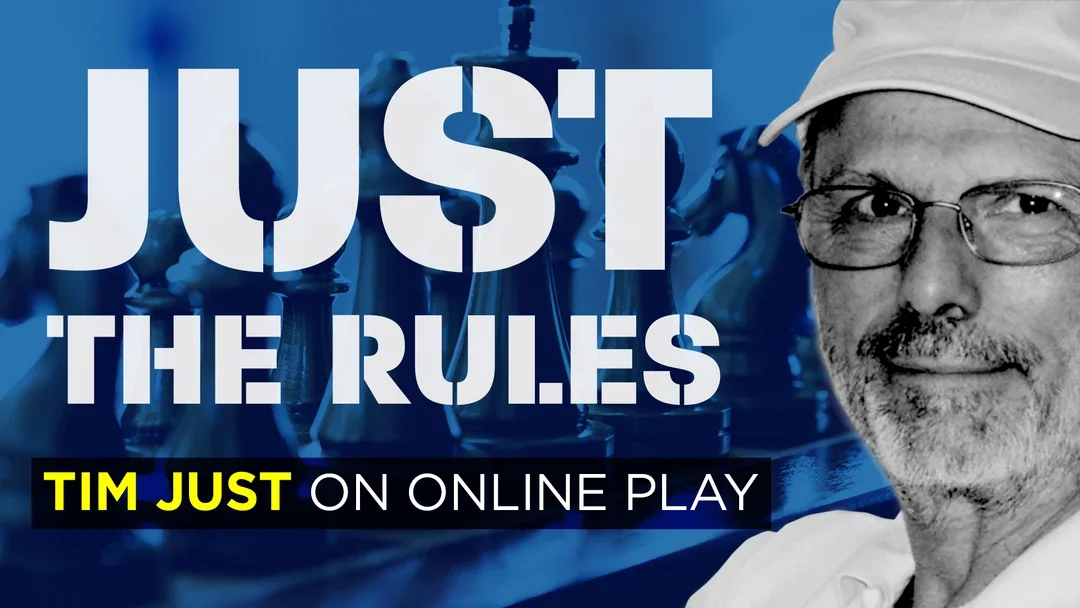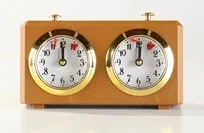
It seems strange to call that row of zeros on a digital chess clock a “flag fall.” The term is left over from the days when analog clocks were the standard. Those timers had actual tiny flags that dropped, or fell, when a player had used up the allotted playing time.

Flag falls in the digital universe are not much of an issue. When the allotted playing time has run out, your chess-playing website’s programming automatically makes that call for you. The same can’t be said for games over the board.
A US Chess Tournament Director getting involved in a game without being asked is rare indeed -- only the players can make a flag fall claim. TDs have to wait to come onboard until (if) the claim is disputed. Then there could be a lot of hoops to jump through. In fact, that was a topic for two of my earlier columns: Flag Falls Part One and Part Two.
The International Chess Federation, FIDE, gives its onsite officials (arbiters) a bit more wiggle room when it comes to flag falls. FIDE arbiters are allowed to call the flag, and can end the game. They can even take notation for the players that are banging out moves. Can we apply that kind of wiggle room to OTB US Chess? In my honest opinion: maybe.
There is something of a precedent in US Chess. About the only time a TD can jump into the fray is if both flags are down and no time forfeit claim has been made in the final time control period. At that point, the game can be declared a draw by the TD (rule 14G2). Otherwise, without some external intervention, the two opponents might play on, and on, and on ...
Since there is a rule that allows only the two players to make a time forfeit claim (rule 13C1), changing that regulation should be a simple matter to also allow the TD to call the flag. Unfortunately, it is not that simple—is it ever? Consider the following:
Situation 1: In a marathon game, you and your adversary have been pushed to the limit. For every intricate move, a complicated countermove, and both of you have made liberal use of nearly all of your allotted time. Ultimately, your flag falls first, but your opponent does not notice and no claim is made. So you keep on shuffling your chess army around move after move and, finally, your opponent’s flag falls too. You make the draw claim: two downed flags equal a draw! You have turned a goose egg into half-point gold!
• If a TD is allowed to call the flag, then you would lose the moment your clock runs out of time. You would lose the ability to play on until your opponent’s time runs out, and thus any chance to make your double-flag draw claim. Zero would be your score, not the half-point for which you had aimed.
Situation 2: In a game using a classical time control, you have a lot more time left on your clock than the woodpusher sitting across from you. Though their flag eventually falls, their final moves of the game happen faster than lightning, and you have not been taking notation for many moves in the end. With the time you have left -- before your own flag falls -- you fill in the missing moves on your scoresheet, before you claim your point.
• If a TD is allowed to call the flag, then you would have no chance to catch up on your missing notation. Because all notation must stop once the flag fall claim is made, your scoresheet would not be usable to verify your claim. An accurate scoresheet is imperative to making a time forfeit claim in classical time control game.
If the US Chess rule-makers allow the TD to also call flag falls, then both of the aforementioned situations need to be addressed. Given that our members are now pretty used to the online software making that same claim, the door has been opened to giving our TDs the same discretion.
Any thoughts?
Tim Just is a National Tournament Director, FIDE National Arbiter, and editor of the 5th, 6th, and 7th editions of the US Chess Rulebook. He is also the author of My Opponent is Eating a Doughnut & Just Law, which are both available from US Chess Sales and Amazon/Kindle. Additionally, Tim recently revised The Guide To Scholastic Chess, a guide created to help teachers and scholastic organizers who wish to begin, improve, or strengthen their school chess program. Tim is also a member of the US Chess Rules Committee. His new column, exclusive to US Chess, “Just the Rules” will help clarify potentially confusing regulations.
The free, updated US Chess Rules (Chapters 1+2 + 10 +11 from the 7th edition rulebook) are now downloadable and available online. Past “Just the Rules” columns can be viewed here. Plus listen to Tim when he was a guest on the US Chess podcast “One Move at a Time.”
Categories
Archives
- January 2026 (4)
- December 2025 (27)
- November 2025 (29)
- October 2025 (39)
- September 2025 (27)
- August 2025 (29)
- July 2025 (43)
- June 2025 (25)
- May 2025 (24)
- April 2025 (29)
- March 2025 (29)
- February 2025 (20)
- January 2025 (24)
- December 2024 (34)
- November 2024 (18)
- October 2024 (35)
- September 2024 (23)
- August 2024 (27)
- July 2024 (44)
- June 2024 (27)
- May 2024 (31)
- April 2024 (51)
- March 2024 (34)
- February 2024 (25)
- January 2024 (26)
- December 2023 (29)
- November 2023 (26)
- October 2023 (37)
- September 2023 (27)
- August 2023 (37)
- July 2023 (47)
- June 2023 (33)
- May 2023 (37)
- April 2023 (45)
- March 2023 (37)
- February 2023 (28)
- January 2023 (31)
- December 2022 (23)
- November 2022 (32)
- October 2022 (31)
- September 2022 (19)
- August 2022 (39)
- July 2022 (32)
- June 2022 (35)
- May 2022 (21)
- April 2022 (31)
- March 2022 (33)
- February 2022 (21)
- January 2022 (27)
- December 2021 (36)
- November 2021 (34)
- October 2021 (25)
- September 2021 (25)
- August 2021 (41)
- July 2021 (36)
- June 2021 (29)
- May 2021 (29)
- April 2021 (31)
- March 2021 (33)
- February 2021 (28)
- January 2021 (29)
- December 2020 (38)
- November 2020 (40)
- October 2020 (41)
- September 2020 (35)
- August 2020 (38)
- July 2020 (36)
- June 2020 (46)
- May 2020 (42)
- April 2020 (37)
- March 2020 (60)
- February 2020 (38)
- January 2020 (45)
- December 2019 (34)
- November 2019 (35)
- October 2019 (42)
- September 2019 (45)
- August 2019 (56)
- July 2019 (44)
- June 2019 (35)
- May 2019 (40)
- April 2019 (48)
- March 2019 (61)
- February 2019 (39)
- January 2019 (30)
- December 2018 (29)
- November 2018 (51)
- October 2018 (45)
- September 2018 (29)
- August 2018 (49)
- July 2018 (35)
- June 2018 (31)
- May 2018 (39)
- April 2018 (31)
- March 2018 (26)
- February 2018 (33)
- January 2018 (30)
- December 2017 (26)
- November 2017 (24)
- October 2017 (30)
- September 2017 (30)
- August 2017 (31)
- July 2017 (28)
- June 2017 (32)
- May 2017 (26)
- April 2017 (37)
- March 2017 (28)
- February 2017 (30)
- January 2017 (27)
- December 2016 (29)
- November 2016 (24)
- October 2016 (32)
- September 2016 (31)
- August 2016 (27)
- July 2016 (24)
- June 2016 (26)
- May 2016 (19)
- April 2016 (30)
- March 2016 (36)
- February 2016 (28)
- January 2016 (32)
- December 2015 (26)
- November 2015 (23)
- October 2015 (16)
- September 2015 (28)
- August 2015 (28)
- July 2015 (6)
- June 2015 (1)
- May 2015 (2)
- April 2015 (1)
- February 2015 (3)
- January 2015 (1)
- December 2014 (1)
- July 2010 (1)
- October 1991 (1)
- August 1989 (1)
- January 1988 (1)
- December 1983 (1)







